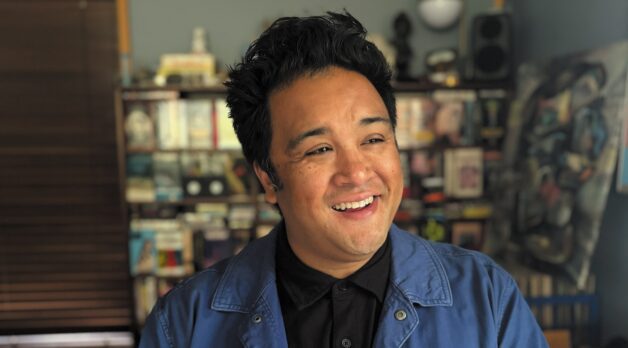Carlos A.F. Lopez
 Carlos A.F. Lopez
Carlos A.F. Lopez

Carlos A.F. Lopez distinctly remembers the “rainy, gross Seattle day” that forever changed his relationship to movies. “I was a goth 12-year-old, and my step-dad took me to see Seven,” he recalls. “He was like, ‘Oh, that movie made me feel awful!’ I said, ‘Me too, but in the best way.’”
A lifelong Seattleite, the 42-year-old Lopez came of age in the “grunge era,” originally finding his artistic footing in that “tight-knit underground scene” as a music video director for friends’ bands. One of his proudest videos is for “Bong Life” by local act The Intelligence. Granted free rein to choose any song from the band’s 2010 album Males, he chose the minute-long tune and decided to depict “a composer hopped-up on opium.” The period details are courtesy of the University of Washington’s costume department. “We had all of the powdered wigs we could ask for,” he laughs.
Lopez never formally attended film school. He took two courses at the Seattle Film Institute, a “rinky-dink program in someone’s house” that nonetheless provided his first exposure to Super 8. He then worked at Alpha Cine Labs—the last motion picture lab in Seattle—as a replacement for fellow director Megan Griffiths. “It was a good way to plug into the Seattle film community because everyone had to come through there,” he says. “It was also cool getting paid minimum wage instead of paying tuition.”
Melding his macabre fascinations with his DIY origins, his breakthrough short, Dream Creep, world premiered at Sundance in January, earning Lopez the Vimeo Award for Best Directing. The tense, 13-minute short revolves around one man’s discovery that he can hear his girlfriend’s nightmare emitting from her ear canal as she slumbers. The idea originated almost a decade ago when Lopez himself awoke “from a really loud dream,” one so cacophonous it made him wonder if these imagined sounds could seep into the real world.
Dream Creep going to Sundance was a “full-circle moment” for the filmmaker, who previously attended the festival in 2016 as a producer on the short The Procedure, which earned the Special Jury Prize for Best Short Fiction: U.S. The director, Calvin Lee Reeder, previously appeared on this list back in 2007. “We were teenage punk kids,” Lopez reminisces fondly of his friend and collaborator. “He’s probably the first person who called me a filmmaker.” He even remembers visiting Reeder in L.A. and buying a copy of Filmmaker at a news stand when the profile dropped.
Nearly 15 years later, COVID lockdown motivated Lopez to develop Dream Creep. He applied to the Sundance Episodic Lab with an early iteration, “more of a sci-fi thriller,” making it to the second round of deliberations. After reconfiguring it into a “crazy horror short,” he sent a finished script to producer Megan Leonard, whom he met when The Procedure screened at the Seattle International Film Festival. They shot the short in Lopez’s home over two days last summer, the production rooted in “a pandemic-era mindset” with a small crew.
Although he didn’t make Dream Creep with the intention of turning it into a feature, the short’s festival run made it “pretty clear” that would be the next step. Lopez is currently writing the script, believing that he’s settled on “a fun way to go big with it that hopefully still subverts expectations.” He’s also insisted on rooting the film in his hometown. “We’re not just tech, coffee and music,” Lopez says. “Seattle’s a very unique place; I’m excited to integrate it into my films.”
As a father of two, Lopez will also explore childhood in the feature. After all, his boys were involved in making the short, demonstrating the iconic “ear-stab scene” for producers with the visual aid of a root vegetable (appropriately credited as “Carrot Creeps”). His oldest son, now 12, is also gradually getting into horror films. “You clearly see the cycles of life,” Lopez says of the parallel between his first-viewing of Seven and his son’s developing taste.
For now, domestic duties prevail in Lopez’s daily life. Alongside feature development, he’s preparing for a most unexpected role: soccer coach. “That’s not my life,” he chuckles in disbelief. “But if I didn’t do it, they were going to disband my son’s team!” Clearly, he approaches DIY not only as a professional parameter, but as a lifelong ethos. — Natalia Keogan/Image: Ignacio Lopez
